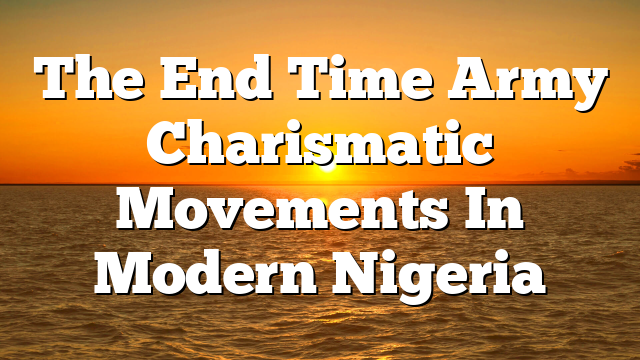190
Book Reviews / Pneuma 30 (2008) 147-191
Matthews A. Ojo, The End-Time Army: Charismatic Movements in Modern Nigeria (Trenton, NJ: Africa World Press, Inc., 2006). vii + 292 pp,. $24.99, paper.
Matthew Ojo’s book came out of his doctoral dissertation research at the London School of Oriental and African Studies and the additional research that he did after complet- ing his doctoral degree. The main thrust of the book is a descriptive historical analysis punctuated by sporadic theoretical interrogation of the chronological trajectory of the evolution and spread of Charismatic and Pentecostal brand of Christianity in Nigerian higher educational institutions and the broader society.
The book asserts certain specific claims, a few examples of which are highlighted. The first is that one cannot understand the evolution and expansion of Pentecostal Christianity in Nigeria without having a fundamental grasp of social changes in the Nigerian state and society since independence from Britain in 1960. The issues relevant here are: the Nigerian civil war that traumatized the relatively stable social order of the country, the oil boom that the country experienced in the 1970s which resulted in rapid economic growth and expan- sion, the massive expansion in higher education, the lack of accountability in public affairs, and the high level of corruption. Tese resulted in a wide level of social inequality and uneven development in the country. T ere was also the cultural shift to hyperindividualism and unrestrained desire for material accumulation, and the sudden implosion of the coun- try’s economic fortunes in the 1980s. All these resulted in widespread social malaise and disillusionment among the young and relatively educated people between the ages of 16 and 36 that were concentrated in urban centers. This age group and many others felt disap- pointed that the post-colonial secular state has failed them and so they started looking for alternative solutions elsewhere. Many found the solution in Pentecostal Christianity.
Second, Pentecostal Christianity in Nigeria has thrived very well because of a relatively free market for religion. The free market for religion allows for an enormous opportunity for competition, innovation, and creativity. While this free market has its positive elements, it has also resulted in excessive misuse of the Christian faith for goals that are no less like that of a business in any competitive capitalist economy.
T ird, one of the core and central elements of Nigerian Pentecostal Christianity is the health and wealth or prosperity gospel. Although the churches recognize two broad forms of prosperity, spiritual (conversion, sanctification, and baptism of the Holy Spirit) and material blessings, the latter receives the most emphasis. Indeed, for Nigerian Pentecostals, it is as though spiritual prosperity is only fundamentally meaningful as a step toward open- ing God’s abundant material blessings in life. Without material blessings, spiritual prosper- ity is suspect.
Fourth, Nigerian Pentecostal Christianity has been built on some selected elements of traditional religious cosmology and the Charismatic revival that was incubated in African Independent Churches. Yet it has also been shaped phenomenally by either people or reli- gious developments in the United Kingdom and the United States. The author provides extensive documentation to support this assertion.
In spite of the excellent work that the book is, there are theoretical and methodological questions about the author’s analysis. Because of space constraints, however, only two sets of questions will be highlighted. First, Ojo asserts that what he found with regard to the
© Koninklijke Brill NV, Leiden, 2008 DOI: 10.1163/157007408X288064
1
Book Reviews / Pneuma 30 (2008) 147-191
191
dynamism of Pentecostal Christianity in Nigeria lends no credence to the central argument of secularization theory. He seems to have rushed to this conclusion given that, as Will Herberg argues, religion could be dynamic but for secular reasons, that is, when secular values or goals are sacralized.
Furthermore, Ojo’s descriptive discussion lacks a critical moment, especially with regard to the fact that the theology and practices of Nigerian Pentecostal churches make no com- mitment to engaging in a rigorous critique of the social structure and institutions of the Nigerian society or the global political economy in the manner that Paulo Freire’s conscien- tization pedagogy was adopted and utilized by the Liberation T eology movement in Latin America. Nigerian Pentecostals are comfortable within the existing capitalist framework of society. T ey just want to prosper in it, and for this reason, they lack the vocabulary or discourse to critique certain types of institutional and systemic injustice, whether at the local, national, or international levels. Ojo could have highlighted this as a concern, at least to alert his Nigerian readers about their role in society.
In spite of all these concerns and others not mentioned in this review, Matthew Ojo should be commended for writing a book that is required reading for religious scholars who want to test the validity of secularization theory in Africa and engage in the debate on what is authentic contextualization and whether contextualization should be simply viewed from a structural-functionalist perspective. Similarly, scholars who are interested in the following theoretical concerns will find the book to be of great value: the implications or conse- quences of religion for development studies and social change in developing societies; the relationship between religious beliefs and practices and the socioeconomic context within which they thrive; the factors that ignite the change from religious sect to denomination; and how leadership and organizational structure affect the ability of New Religious Move- ments to live out or distort their original idealistic values and commitments.
Reviewed by Samuel Zalanga
2
3

Leave a Reply